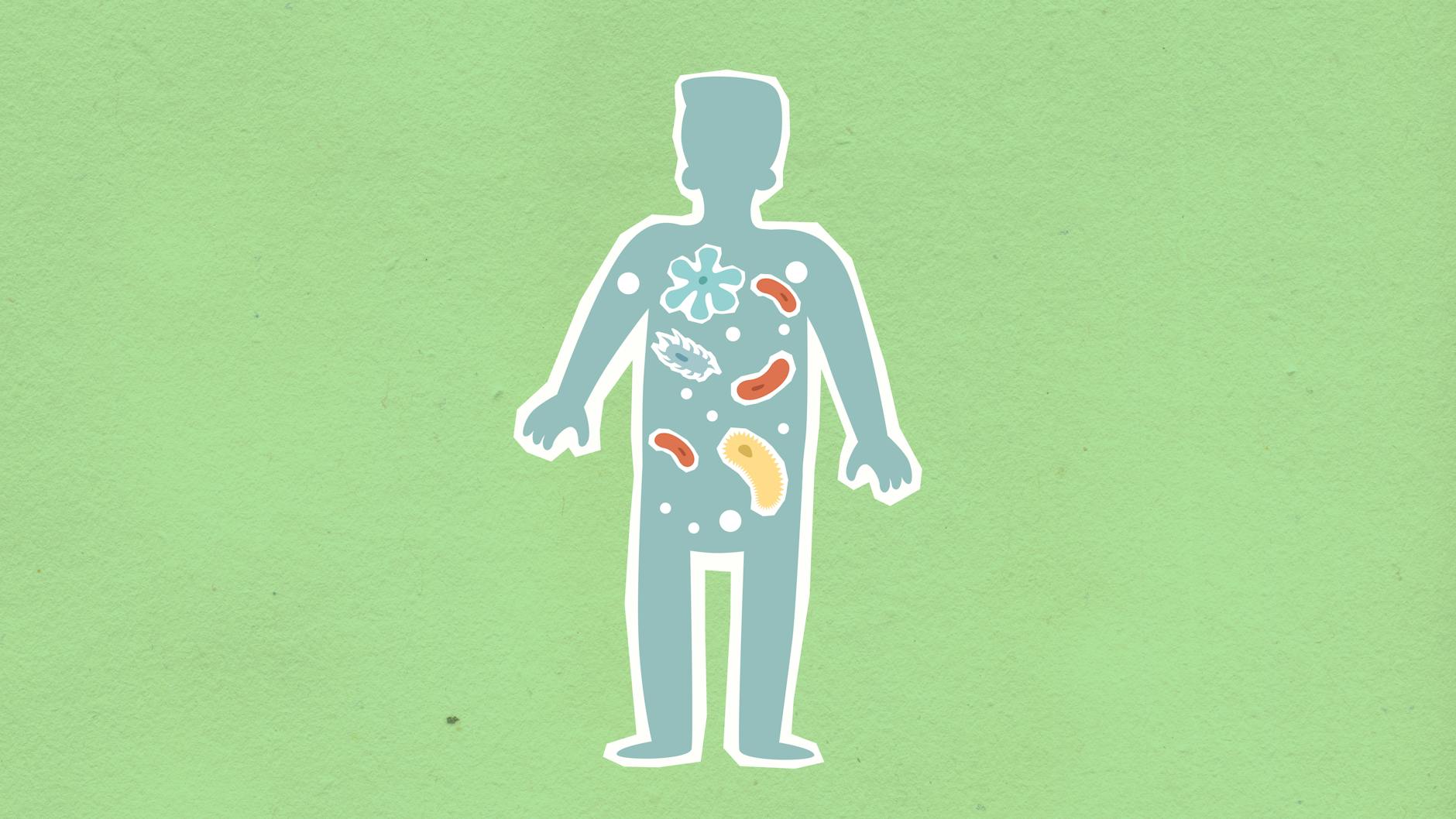
Have you ever felt butterflies in your stomach before a big presentation? Or experienced a “gut feeling” about a decision? 🦋 These sensations aren’t just coincidences—they’re evidence of the powerful connection between your gut and the rest of your body. In fact, your gut health plays a far more crucial role in your overall wellbeing than you might realize.
From your brain to your skin, and even your heart, the state of your gut microbiome can profoundly impact various aspects of your health. 🧠💪🏼💖 But how exactly does this work? And more importantly, what can you do to ensure your gut is in top shape? In this blog post, we will explain, How your gut health affects your whole body ? and we’ll dive deep into the fascinating world of gut health and explore its far-reaching effects on your entire body. Get ready to discover how nurturing your gut could be the key to unlocking better overall health and wellness.
Understanding Gut Health :

Defining the gut microbiome
The gut microbiome refers to the vast community of microorganisms residing in our digestive tract. This complex ecosystem consists of trillions of bacteria, fungi, viruses, and other microbes that play a crucial role in our overall health.
Key functions of gut bacteria
Gut bacteria perform several essential functions that contribute to our well-being:
- Nutrient absorption
- Vitamin synthesis
- Immune system regulation
- Metabolism support
- Protection against pathogens
| Function | Description |
|---|---|
| Nutrient absorption | Breaks down complex carbohydrates and fiber |
| Vitamin synthesis | Produces vitamins K and B |
| Immune regulation | Trains and modulates the immune system |
| Metabolism support | Influences energy balance and metabolism |
| Pathogen protection | Competes with harmful bacteria for resources |
Factors influencing gut health
Several factors can impact the balance of our gut microbiome:
- Diet: The food we consume directly affects the composition of our gut bacteria
- Stress: Chronic stress can disrupt the gut microbiome balance
- Medications: Antibiotics and other drugs can alter gut bacteria populations
- Exercise: Regular physical activity promotes a diverse gut microbiome
- Sleep: Poor sleep quality can negatively affect gut health
Now that we understand the basics of gut health, let’s explore how it connects to our brain function and overall mental well-being.
The Gut-Brain Connection :

The role of the vagus nerve
The vagus nerve serves as a crucial communication highway between the gut and the brain. This bidirectional connection allows for constant information exchange, influencing both our digestive processes and mental states.
| Vagus Nerve Functions | Impact on Gut-Brain Connection |
|---|---|
| Transmits signals | Enables two-way communication |
| Regulates digestion | Influences appetite and satiety |
| Modulates inflammation | Affects immune responses |
| Controls heart rate | Impacts stress responses |
How gut health affects mood and cognition
The state of our gut microbiome can significantly influence our mental well-being and cognitive functions. A healthy gut produces neurotransmitters like serotonin, which plays a vital role in regulating mood and emotions.
Key ways gut health impacts mood and cognition:
- Production of neurotransmitters
- Regulation of inflammation
- Influence on nutrient absorption
- Modulation of stress responses
Stress and its impact on gut function
Stress can have a profound effect on gut health, creating a cyclical relationship between mental state and digestive function. When we experience stress, it can:
- Alter gut motility
- Increase intestinal permeability
- Disrupt the balance of gut bacteria
- Trigger inflammation in the digestive system
Understanding this intricate connection between stress and gut function underscores the importance of managing stress for overall health. By nurturing our gut health, we can positively influence our mental well-being, and conversely, by managing stress, we can support a healthy digestive system.
Gut Health and Immune System :

The gut as the body’s largest immune organ
Did you know that your gut is actually the largest immune organ in your body? It’s true! The gut houses approximately 70-80% of your immune cells, making it a crucial player in your overall health and well-being. This extensive network of immune cells, along with the trillions of microorganisms residing in your gut, forms a powerful defense system against harmful pathogens.
| Gut Immune System Components | Function |
|---|---|
| Gut-associated lymphoid tissue (GALT) | Produces and maintains immune cells |
| Peyer’s patches | Monitors intestinal bacteria and initiates immune responses |
| Intestinal epithelial cells | Forms a physical barrier and secretes antimicrobial peptides |
| Mucus layer | Traps pathogens and prevents them from reaching the gut lining |
How gut bacteria train the immune system
The relationship between gut bacteria and your immune system is a two-way street. Your gut microbiome plays a crucial role in educating and modulating your immune system. Here’s how:
- Stimulates the production of antibodies
- Helps differentiate between harmful and beneficial microorganisms
- Promotes the development of regulatory T cells, which prevent autoimmune reactions
- Produces short-chain fatty acids that reduce inflammation
Autoimmune conditions and gut health
Emerging research suggests a strong link between gut health and autoimmune conditions. An imbalanced gut microbiome, often referred to as dysbiosis, may contribute to the development of various autoimmune disorders. Some examples include:
- Inflammatory bowel disease (IBD)
- Rheumatoid arthritis
- Type 1 diabetes
- Multiple sclerosis
Maintaining a healthy gut microbiome through proper diet, stress management, and other lifestyle factors may help reduce the risk of developing autoimmune conditions or manage existing ones more effectively.
Digestive Health and Overall Wellness :

Nutrient Absorption and Gut Function
The health of your digestive system plays a crucial role in nutrient absorption, which directly impacts your overall wellness. A well-functioning gut efficiently breaks down food and absorbs essential nutrients, providing your body with the fuel it needs to thrive.
Key Functions of a Healthy Gut:
- Digestion of complex molecules
- Absorption of vitamins and minerals
- Production of certain vitamins (e.g., K and B12)
- Elimination of waste and toxins
| Nutrient | Function | Impact of Poor Absorption |
|---|---|---|
| Proteins | Muscle building, enzyme production | Weakened immune system, muscle loss |
| Carbohydrates | Energy production | Fatigue, mood swings |
| Fats | Hormone production, cell membrane integrity | Dry skin, poor brain function |
| Vitamins | Various metabolic processes | Deficiency-related disorders |
Common Digestive Issues and Their Widespread Effects
Digestive problems can have far-reaching consequences beyond the gut itself. Issues like leaky gut syndrome, irritable bowel syndrome (IBS), and chronic constipation can affect multiple body systems.
Effects of Digestive Issues:
- Reduced energy levels
- Compromised immune function
- Mood disorders and cognitive issues
- Skin problems (e.g., acne, eczema)
- Hormonal imbalances
The Link Between Gut Health and Weight Management
Your gut microbiome plays a significant role in weight regulation. The balance of bacteria in your digestive system can influence metabolism, appetite, and even how your body stores fat.
Now that we’ve explored the intricate connection between digestive health and overall wellness, let’s examine how gut health impacts your skin, another vital organ system.
Skin Health and the Gut :

The gut-skin axis explained
The gut-skin axis refers to the intricate relationship between our digestive system and skin health. This connection is facilitated by the immune system, hormones, and neural pathways. Research has shown that the state of our gut microbiome can significantly influence skin conditions and overall skin appearance.
| Gut-Skin Axis Components | Function |
|---|---|
| Immune System | Regulates inflammation in both gut and skin |
| Hormones | Influence skin oil production and hydration |
| Neural Pathways | Communicate between gut and skin |
How gut imbalances manifest on the skin
Gut imbalances can lead to various skin issues, including:
- Acne
- Eczema
- Psoriasis
- Rosacea
- Premature aging
These conditions often arise due to increased intestinal permeability, also known as “leaky gut,” which allows toxins and undigested food particles to enter the bloodstream, triggering inflammatory responses that can manifest on the skin.
Probiotics for skin health
Probiotics play a crucial role in maintaining a healthy gut-skin axis. These beneficial bacteria can:
- Reduce inflammation
- Strengthen the gut barrier
- Improve nutrient absorption
- Enhance skin hydration and elasticity
Incorporating probiotic-rich foods or supplements into your diet can significantly improve both gut and skin health. Some excellent sources of probiotics include yogurt, kefir, sauerkraut, and kombucha.
Now that we understand the connection between gut and skin health, let’s explore how our gut bacteria can influence heart health.
Heart Health and Gut Bacteria :

Gut microbiome’s influence on cholesterol levels
The gut microbiome plays a crucial role in regulating cholesterol levels, directly impacting heart health. Certain gut bacteria can metabolize bile acids, which are essential for cholesterol metabolism. This process helps maintain a healthy balance of cholesterol in the body.
| Gut Bacteria Type | Effect on Cholesterol |
|---|---|
| Lactobacillus | Lowers LDL cholesterol |
| Bifidobacterium | Increases HDL cholesterol |
| Akkermansia | Improves overall lipid profile |
The link between gut health and blood pressure
A healthy gut microbiome can significantly influence blood pressure regulation. Gut bacteria produce short-chain fatty acids (SCFAs) that help maintain blood pressure within normal ranges. Additionally, a diverse gut microbiome can:
- Reduce inflammation in blood vessels
- Improve nitric oxide production, promoting vasodilation
- Regulate the renin-angiotensin system, a key player in blood pressure control
Reducing inflammation for better heart health
Chronic inflammation is a major risk factor for heart disease. A balanced gut microbiome can help reduce systemic inflammation, thereby supporting heart health. Here’s how:
- Production of anti-inflammatory compounds
- Strengthening the gut barrier to prevent leaky gut
- Modulation of the immune system response
By nurturing a healthy gut microbiome, you can positively impact your heart health through multiple pathways. This interconnection highlights the importance of maintaining a balanced diet and lifestyle for overall cardiovascular well-being.
Improving Your Gut Health :

Dietary changes for a healthier gut
To improve your gut health, making mindful dietary changes is crucial. Focus on incorporating a variety of fiber-rich foods, such as fruits, vegetables, whole grains, and legumes. These foods promote the growth of beneficial gut bacteria and support regular bowel movements.
- Increase intake of:
- Leafy greens (spinach, kale)
- Colorful vegetables (bell peppers, carrots)
- Berries and citrus fruits
- Nuts and seeds
- Whole grains (quinoa, brown rice)
Reduce consumption of processed foods, artificial sweeteners, and excessive sugar, as these can negatively impact gut bacteria balance.
The benefits of fermented foods
Fermented foods are excellent for gut health, as they contain beneficial bacteria that support your microbiome. Incorporating these foods into your diet can improve digestion and boost your immune system.
| Fermented Food | Benefits |
|---|---|
| Yogurt | Probiotics, calcium, protein |
| Kefir | Diverse probiotic strains, vitamins |
| Kimchi | Fiber, vitamins, antioxidants |
| Kombucha | Probiotics, antioxidants |
| Sauerkraut | Fiber, vitamins C and K |
Lifestyle factors that impact gut health
Beyond diet, several lifestyle factors play a crucial role in maintaining a healthy gut:
- Regular exercise: Promotes diversity in gut bacteria
- Stress management: Chronic stress can disrupt gut balance
- Adequate sleep: Essential for overall health, including gut function
- Hydration: Supports digestive processes and nutrient absorption
When to consider probiotic supplements
While a balanced diet should provide sufficient probiotics, some individuals may benefit from supplements. Consider probiotic supplements if you:
- Have taken antibiotics recently
- Experience chronic digestive issues
- Have a diagnosed gut-related condition
Always consult with a healthcare professional before starting any supplement regimen to ensure it’s appropriate for your specific needs and health status.

Your gut health plays a crucial role in your overall well-being, influencing everything from your brain function to your immune system, skin, and heart health. The intricate connection between your gut and various bodily systems highlights the importance of maintaining a healthy digestive ecosystem. By understanding this relationship, you can take proactive steps to improve your gut health and, in turn, enhance your overall wellness.
To prioritize your gut health, focus on consuming a diverse, fiber-rich diet, staying hydrated, managing stress, and incorporating probiotics and prebiotics into your daily routine. These simple yet effective strategies can help nurture your gut microbiome, leading to improved digestion, stronger immunity, clearer skin, and better heart health. Remember, a healthy gut is the foundation for a healthier you, so take the time to care for your digestive system and reap the benefits throughout your entire body.












